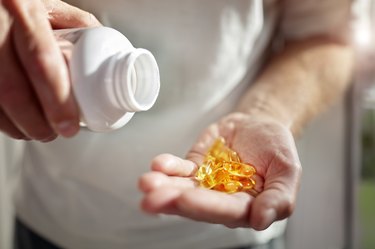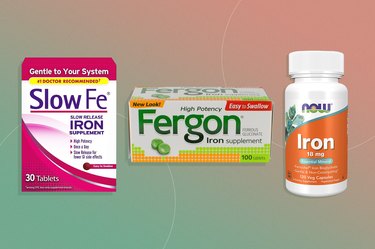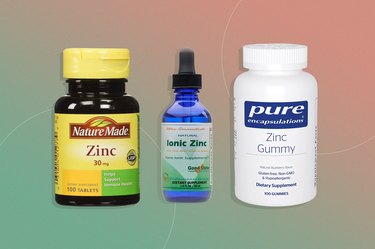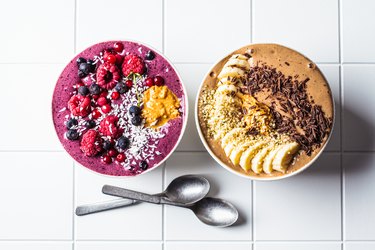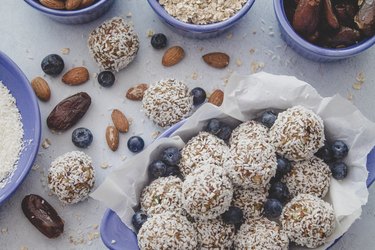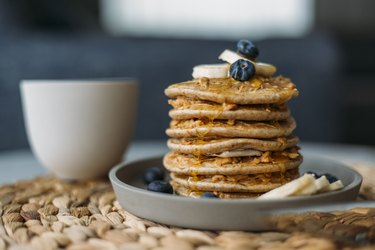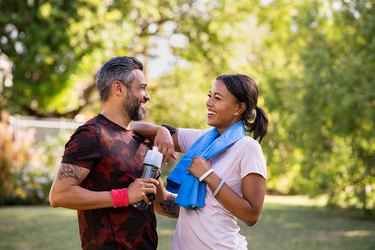
Ever since you turned 50, your get-up-and-go seems to have got up and went. What gives?
There are many reasons your energy might be sapped, but also many ways to increase energy and motivation. While you might not have the stamina of your 20s, you can learn how to stay energized all day.
Video of the Day
Video of the Day
"Energy loss is not a normal part of aging, but may travel with increased use of medication, sleep problems and other issues linked to advancing age," says Alicia I. Arbaje, MD, MPH, an associate professor of medicine in the Division of Geriatric Medicine and Gerontology at Johns Hopkins University School of Medicine in Baltimore, Maryland.
Here's more on likely energy-zappers and what you can do about them.
1. Review Your Medications
Energy loss can be a side effect of medication you take to treat a chronic condition, especially if you're one of the more than 40 percent of older adults on five or more prescription drugs, according to a report from the Lown Institute, a health care think tank in Brookline, Massachusetts.
"Sometimes your medication can make you feel heavy and depleted or like you are in a fog," Dr. Arbaje says. Schedule a medication review with your doctor to see if medication is causing your loss of energy and whether there's a different drug to try.
2. Check for Nutrient Deficiencies
Your energy loss could be caused by nutrient deficiencies like a shortfall of iron, vitamin D, B12 or zinc, Dr. Arbaje says. Your doctor can order a blood test to measure levels of various nutrients.
"This can be an easy correction," she says, including diet changes or supplements if necessary. Blood tests can also rule out other possible causes of your energy loss, Dr. Arbaje adds.
3. Stay Hydrated
Older adults are more susceptible to dehydration and can be less sensitive to thirst. "Most older people are under-hydrated and walk around jacked up on caffeine, which actually makes dehydration worse," Dr. Arbaje says.
Aim for 8 to 12 cups of water throughout the day, more if you're outside in the heat or getting more exercise than usual, according to the U.S. Department of Veterans Affairs. "You [may] start feeling a difference in energy almost instantaneously," Dr. Arbaje says.
4. Eat a More Nutritious Breakfast
Instead of starting the day with eggs and bacon, opt for fruits, veggies or whole grains for breakfast. These foods will provide the glucose your body uses for energy as quickly as possible, Dr. Arbaje says.
"Save protein and fat for later in the day when you don't need as much energy, as these take more energy to digest," she adds.
5. Practice Good Sleep Hygiene
Sleep troubles are more common in older adults due to pain and other issues, but getting good quality sleep, usually 7 to 9 hours each night, will leave you feeling more energized during the day, Dr. Arbaje says.
Improve your sleep hygiene by setting and sticking to the same wake-up and bedtimes, even on weekends, and avoid stressful activities before bed. "Wind down with non-caffeinated herbal tea or another relaxing ritual to ease your mind before bed," she says. But if you can't fall or stay asleep, work with your doctor to identify and treat any sleep disorders, like sleep apnea, that could be the reason for low energy, Dr. Arbaje adds.
6. Try a Mind-Body Practice
A relaxing, invigorating mind-body practice like mindfulness or yoga may help boost your energy levels, according to a small December 2016 study in Mindfulness. People who participated in 25 minutes a day of Hatha yoga — a form of yoga that involves poses, breathing exercises and meditation — or mindfulness meditation showed greater improvement in measures of their energy levels than people who read quietly for 25 minutes.
Starting a practice like this might feel more doable after implementing some of the other strategies above. "Once you're drinking more water and making other changes, you will have more energy to do yoga, walk and start an exercise routine, which will further boost energy," Dr. Arbaje says.
- Alicia I. Arbaje, MD, MPH, PhD, associate professor of medicine, Division of Geriatric Medicine and Gerontology, Johns Hopkins University School of Medicine, Baltimore, Maryland
- Lown Institute: “Medication Overload and Older Americans”
- U.S. Department of Veterans Affairs: “Water – Drink Up!”
- Mindfulness: “Examining the Acute Effects of Hatha Yoga and Mindfulness Meditation on Executive Function and Mood”
